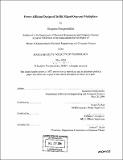| dc.contributor.advisor | Victor Zyuban and Thomas F. Knight, Jr. | en_US |
| dc.contributor.author | Pornpromlikit, Sataporn, 1979- | en_US |
| dc.contributor.other | Massachusetts Institute of Technology. Dept. of Electrical Engineering and Computer Science. | en_US |
| dc.date.accessioned | 2005-06-02T19:27:01Z | |
| dc.date.available | 2005-06-02T19:27:01Z | |
| dc.date.copyright | 2004 | en_US |
| dc.date.issued | 2004 | en_US |
| dc.identifier.uri | http://hdl.handle.net/1721.1/17968 | |
| dc.description | Thesis (M. Eng.)--Massachusetts Institute of Technology, Dept. of Electrical Engineering and Computer Science, 2004. | en_US |
| dc.description | Includes bibliographical references (p. 53). | en_US |
| dc.description.abstract | Multiplication is an expensive and slow arithmetic operation, which plays an important role in many DSP algorithms. It usually lies in the critical-delay paths, having an effect on performance of the system as well as consuming large power. Consequently, significant improvements in both power and performance can be achieved in the overall DSP system by carefully designing and optimizing power and performance of the multiplier. This thesis explores several circuit-level techniques for power-efficiently designing multipliers, including supply voltage reduction, efficient multiplication algorithms, low power circuit logic styles, and transistor sizing using dynamic and static tuners. Based on these techniques, several 16-bit multipliers have been successfully designed and implemented in 0.13[micro]m CMOS technology at the supply voltage of 1.5V and 0.9V. The multipliers are modified to handle multiplications of two 16-bit operands in which each can be either signed magnitude or two's complement formats. Examining power-performance characteristics of these multipliers reveals that both array and tree structures are feasible solutions for designing 16-bit multipliers, and complementary CMOS and single-ended CPL-TG logics are promising candidates for power-efficient design. The appropriate choices of structures and logic styles depend on power and performance constraints of the particular design. | en_US |
| dc.description.statementofresponsibility | by Sataporn Pornpromlikit. | en_US |
| dc.format.extent | 53 p. | en_US |
| dc.format.extent | 2616726 bytes | |
| dc.format.extent | 2621261 bytes | |
| dc.format.mimetype | application/pdf | |
| dc.format.mimetype | application/pdf | |
| dc.language.iso | eng | en_US |
| dc.publisher | Massachusetts Institute of Technology | en_US |
| dc.rights | M.I.T. theses are protected by copyright. They may be viewed from this source for any purpose, but reproduction or distribution in any format is prohibited without written permission. See provided URL for inquiries about permission. | en_US |
| dc.rights.uri | http://dspace.mit.edu/handle/1721.1/7582 | |
| dc.subject | Electrical Engineering and Computer Science. | en_US |
| dc.title | Power-efficient design of 16-bit mixed-operand multipliers | en_US |
| dc.type | Thesis | en_US |
| dc.description.degree | M.Eng. | en_US |
| dc.contributor.department | Massachusetts Institute of Technology. Department of Electrical Engineering and Computer Science | |
| dc.identifier.oclc | 57174181 | en_US |
